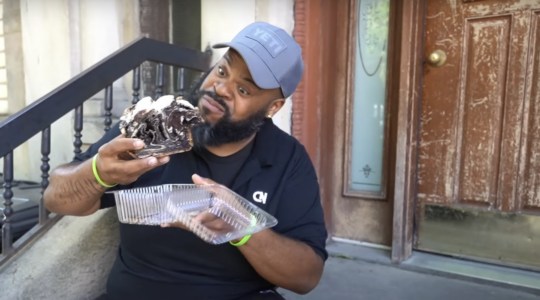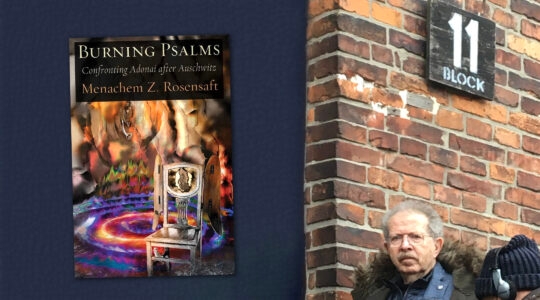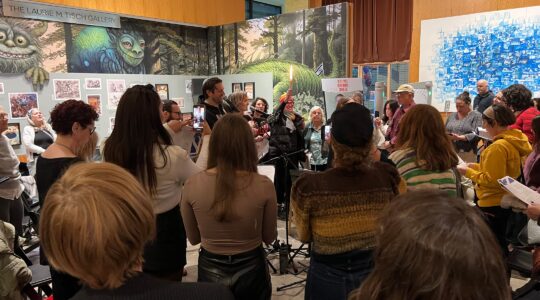As the rain came down Sunday and a crowd estimated at about 1,000 people listened to speeches, the organizers of a right-wing rally opposed to President Barack Obama’s policies on the Israeli-Palestinian conflict fielded a request from U.S. Rep. Anthony Weiner (D-Brooklyn and Queens).
Beth Galinsky, founder of the Jewish Action Alliance, the main group behind Sunday’s Manhattan rally, said a representative of Weiner approached her associates asking if the congressman could speak at the event. The request triggered a “back and forth” among the event’s organizers between whether he should be accorded the “respect” due to his office or whether he might deliver what they would have viewed as the wrong message — some sort of Democratic “spin” on the president’s policies.
It’s unclear whether Weiner himself was sitting in a car near the rally, waiting for a positive or negative response. Galinsky said Monday she believed he was, while a spokesman for Weiner, a member of the House Jewish Caucus, declined to talk about the episode on the record.
But the outcome of the episode is clear: Galinsky and other organizers relayed word back to Weiner that he could speak — but only on the condition that his comments would represent a firm break with the White House over its relationship with Israel. For whatever reason, the congressman wound up not speaking.
The episode may say more about the nature of the rally, held across Second Avenue from Israel’s New York Consulate, than about Weiner or his views. Indeed, in several statements and op-eds during the past two months on the latest twists in Mideast policy, the congressman has sounded closer to the rally’s organizers than he has to the president.
One piece, written for the Jewish Press, says the timing of Israel’s announcement on the construction of East Jerusalem housing “may have been embarrassing” for Vice President Joseph Biden and Israeli Prime Minister Benjamin Netanyahu, “but it certainly did not warrant the repeated and vituperative denunciation it got. A minor disagreement was treated like an earth-shattering diplomatic breach.” The column goes on to call Jerusalem the capital of a sovereign nation — “hardly some far-off outpost” — and to label Israel an important ally, “not a punching bag.”
But Galinsky didn’t consider Weiner’s past comments sufficient enough to have earned an invitation to speak, nor did she think that Sen. Charles Schumer (D-N.Y.) or members of the city’s House delegation had done enough to oppose the administration.
What they should be doing, she said, “is getting out there and rebuking” the president, Secretary of State Hillary Clinton and White House advisers, including Zbigniew Brzezinski. In the meantime, inviting any of them to speak at the rally, where they may have tried to “spin” the president’s policies into a pro-Israel stance, would have “wasted” the time of those who came to the event.
Rally-goers, instead, heard from speakers representing an array of conservative groups, including the Hudson Institute, Americans for a Safe Israel, Z Street, the World Committee for the Land of Israel, the Zionist Organization of America and the Jerusalem Reclamation Project. The Republican Jewish Coalition was represented, as was Manhigut Yehudit, an Israeli organization that favors a theocracy for the Jewish state.
If such a list suggested healthy servings of red meat, that’s precisely what many of the speakers gave rally-goers.
Michael Ledeen, a fellow at the neoconservative Foundation for the Defense of Democracies, told listeners that the White House policy of pressing Israel, one of the country’s key allies, while engaging enemies was “self-defeating and suicidal. … The American people understand this better than American leaders. Republicans understand this better than Democrats. And American Christians understand this better than American Jews,” the majority of whom voted for Obama.
Jeffrey Wiesenfeld, a prominent activist in the Jewish community and Republican circles, called Obama “a product of his many influences,” a suggestion, perhaps, that his childhood in Indonesia, a Muslim country, and associates like the Rev. Jeremiah Wright and ‘60s radical William Ayers may have shaped what he believes today.
Like other speakers, he blasted Democratic members of Congress who haven’t criticized the president’s behavior toward Israel. When he mentioned Schumer, who last week slammed Obama’s stand against the expansion of Israeli settlements in Jerusalem, one rally-goer shouted, “Too late!”
State Assemblyman Dov Hikind (D-Brooklyn), a supporter of Israel’s settlement movement, took aim not only at Jewish Democrats in Congress, but at mainstream Jewish groups, another target of the rally’s speakers. The event’s organizers had reached out to them, but they didn’t endorse the rally or participate, he said, asking, “Where are they?”
“We reject Jewish leadership,” said Pamela Geller, known for her right-wing blog Atlas Shrugs and for her new group, Stop Islamization of America. Geller singled out Malcolm Hoenlein, the top executive at the Conference of Presidents of Major American Jewish Organizations, saying he should have told the region’s Jewish day schools to show up at the rally. She also likened today’s Jewish leaders to those who failed to do more during the Holocaust to save Jews.
“Are we going to replicate our failure during World War II?” Geller asked.
Galinsky, speaking by phone before and after the rally, said mainstream organizations like the Anti-Defamation League, the Conference of Presidents and UJA-Federation of New York “were all informed” about the rally, although she, herself, didn’t contact them. She also objected to any description of the rally as “right wing.”
Some speakers, she said, considered themselves Democrats and may have even voted for Obama. “It may not be so easy to label everyone,” Galinsky added.
Indeed, one speaker, Joy Brighton of the group Stop Shariah Now, told the rally she cast her ballot for Obama in 2008 — a comment that drew jeers — but she now considers that move a mistake.
The roster of speakers also included Rabbi Joseph Potasnik, executive vice president of the New York Board of Rabbis, who cautioned his listeners against those politicians who say they’re working “behind the scenes” to reverse White House policy. The expression is one that was used during World War II, as Jews died in the Holocaust, and during the movement to free Soviet Jewry, he said.
In an interview after the rally, Rabbi Potasnik said he came to the rally as an individual, not as a representative of his agency, and that he did so because of his belief that “we haven’t heard enough from our elected officials” about the dangers of Obama’s Mideast policy.
“If nothing else, there has to be some expression to them that the Jewish community is concerned,” the rabbi said.
Some of that concern was voiced by rally participants. Lauren Kreisberg, 31, of Montclair, N.J., said that although she applauds the president’s attempt at restarting peace negotiations, she also believes “he’s putting Israel at a lot of risk. … I don’t see a problem building Jewish settlements in an Arab neighborhood.”
Alla Roytberg, 43, of Forest Hills, like others at the rally, was wearing a button likening Obama’s treatment of Iran to Neville Chamberlain’s appeasement of Hitler. A native of St. Petersburg, Roytberg said she believes the president lacks a strong stand on any issue, including the Israeli-Palestinian conflict, and would adopt any policy he sees as “politically expedient,” including one that sells Israel down the river.
Meanwhile, phone messages left with several mainstream Jewish organizations asking for comment about the rally went unreturned. But Abraham Foxman, national director of the ADL, called the criticism of mainstream Jewish leaders “nonsense.”
If the speakers “bothered to look,” he said, “they would have read the ADL’s response” to tensions between the White House and Israel, “the Conference of Presidents’ response, AIPAC’s response — groups that are a little more serious than the ones that sponsored the rally.”
The rally also drew criticism from David Harris, president of the National Jewish Democratic Council, who called Obama’s commitment to Israel “rock solid.”
|
Signup for our weekly email newsletter here. Check out the Jewish Week’s Facebook page and become a fan! And follow the Jewish Week on Twitter: start here. |
The New York Jewish Week brings you the stories behind the headlines, keeping you connected to Jewish life in New York. Help sustain the reporting you trust by donating today.




